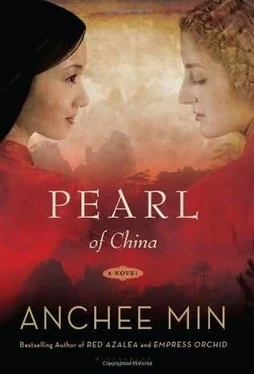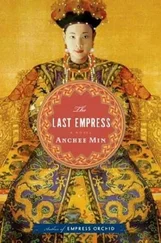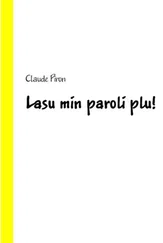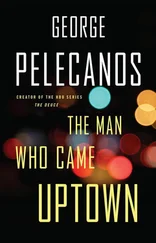“ Pearl,” I called.
She rose and came to me and collapsed in my arms.
Softly, I told her that I had come to deliver Hsu Chih-mo’s package.
She nodded.
I passed her the package and said, “I’ll be outside.”
When she emerged from the farmhouse, she looked like an Oriental, her eyes were so swollen from crying.
She asked me to take a look at the first page of Hsu Chih-mo’s book. The title was Lonely Night.
Across the screen the autumn moon
stares coldly from the sky
With silken fan I sit and flick
the fireflies sailing by
The night grows colder every hour
it chills the heart
To watch the spinning Damsel
from the Herd Boy far apart
A wilderness alone remains
all garden glories gone
The river runs unheeded by
weeds grow unheeded on
Dusk comes the east wind blows and birds
pipe forth a mournful sound
Petals like nymphs from balconies
come tumbling to the ground
I had known Pearl ’s loneliness since we were children. She had always searched for her “own kind.” That didn’t mean another Westerner. It meant another soul that experienced and understood both the Eastern and Western worlds.
It was in Hsu Chih-mo that Pearl had found what she was looking for. With him she had not been lonely. If she were the cresting wave’s cheerful foam, Hsu Chih-mo would be the wrinkled sea sand beneath.
Ashes gathered at the bottom of the incense burner.
The sun set behind the hill and the room fell instantly dark.
In the future I would understand the connection between Pearl ’s accomplishments as a novelist and her love of Hsu Chih-mo. Over the eighty books she would create in her lifetime, she would carry on her affair with Hsu Chih-mo.
“Writing a novel is like chasing and catching spirits,” Pearl Buck would say of her writing process. “The novelist gets invited into splendid dreams. The lucky one gets to live the dream once, and the luckiest over and over.”
She was the luckiest one. She must have met with his spirit throughout the rest of her life. I will never forget the moment Pearl lit her last stick of incense. She composed a poem in Chinese bidding good-bye to Hsu Chih-mo.
Wild summer was in your gaze
Earth laughs in flowers
Lust in the chill of the grave
Wind’s hand touches
Mind bent with the weight of sorrow.
Orchid boat I board alone
Spring rain blurs the lantern light
Deep green are my parting thoughts of you
I considered myself lucky too. Although Hsu Chih-mo didn’t love me, he trusted me. It made our ordinary friendship extraordinary. There was commitment and devotion between us. Hsu Chih-mo had asked me to keep the original manuscripts of his poetry. His wife had threatened to burn them because in the pages she “smelled the scent of another woman.”
I became the keeper of Hsu Chih-mo’s secrets. I was so faithful that I didn’t even share those manuscripts with Pearl. I’d like to think that Hsu Chih-mo loved me in a special way. The most important lesson he taught me was that there was no one singular perspective on things or emotions in the universe-no one way of comprehending truth.
Hsu Chih-mo, the man, the child, the poet who smiled at all that passed beyond his understanding, would remain in my life. I possessed, literally, his poetry, although I wished that I had won his heart. After Hsu Chih-mo’s wife died, I began to release his poems one at a time. My intent was to make his legacy last. I created ambiguity and the public embraced it. “Let’s allow mystery to pervade,” I said to journalists.
Columnists speculated about what might have happened if Hsu Chih-mo had lived. The result was that the poems I released were printed in the newspapers. The public was hungry for Hsu Chih-mo. There were always new discoveries about his romantic life. He was more famous after death.
Over time, I became the collector of everything Hsu Chih-mo. In addition to his poems and letters, I sought copies of written materials about him, including the most frivolous gossip.
After Hsu Chih-mo’s death I moved to Nanking to be closer to Pearl and to his memory.
In the name of the Nanking Daily, I organized the Hsu Chih-mo Conference. The event satisfied my desire to hear his name pronounced on the lips of the young. Female university students carried The Collected Poems of Hsu Chih-mo under their arms like fashionable handbags. They reminded me of myself, the way I once was in love, still was, and would forever be. I whispered Hsu Chih-mo’s name in darkness and daylight, alone or with Pearl or without her.
People from every corner of China attended my conference. There were suspicions, rumors, and questions regarding the reason Hsu Chih-mo had chosen me to keep his papers. “We were best friends,” I answered with ease.
I felt as if I were living in a fictional world when the list of Hsu Chih-mo’s mistresses and love interests continued. The details were imaginative and vivid. Some did get close to the truth. Yet in the end none hit the target.
I enjoyed the colorful interpretations of Hsu Chih-mo’s life while knowing that I alone held the truth.
Hsu Chih-mo’s death reminded us how fragile life could be. Looking back, I realized that it was Dick’s love for Hsu Chih-mo that bound us together. Dick had once been combative and imposing, and Hsu Chih-mo had changed him. Dick acknowledged, “If I am a giant today, it is because Hsu Chih-mo taught me the difference between physical and intellectual height.”
I married Dick Lin after Hsu Chih-mo died. He worked in Shanghai and came to see me in Nanking once a month.
Pearl continued to teach at Nanking University but she no longer lingered on campus. Every time she saw the tree that Hsu Chih-mo used to sit under waiting for her, she would burst into tears. Hsu Chih-mo was more in her life than when he had been alive.
“Hsu Chih-mo was the only Chinese man I know who was true to himself,” Pearl told me. “In his way, he was daring and almost impulsive. I couldn’t help but love him. It was selfish of me. But I needed him. We needed each other.”
One thing Pearl seemed unaware of was that Hsu Chih-mo had also been her challenge. I was never a challenge for Pearl, in contrast. She was attracted to challenges. When she lived in China, she never looked down on anyone, but she also never looked up to anyone until Hsu Chih-mo.
Without Pearl and Hsu Chih-mo in my life, I never would have been the person I am today. The three of us discussed Shakespeare, Rousseau, Dickens, and classic Chinese poets and novelists. Although I published and impressed others as a writer, it was never my air and rice, as it was for Pearl and Hsu Chih-mo.
Like Carie, Pearl worked obsessively for the church and offered her charity. She played Carie’s piano, which was falling apart. The keys either didn’t work or were out of tune. Pearl made the best of it. During Christmas season, we gathered. Pearl retranslated Absalom’s lyrics into Chinese. We spent the evenings singing Carie’s favorites, from “The God of Glory” to “Hail the Heaven-Born Prince of Peace”; from “Love Has Come” to “Hark the Herald Angels Sing.”
Papa no longer worried about the church attendance-the members of the Chin-kiang congregation by now far outnumbered those of the local Buddhist temples. More and more people were choosing the Foreign God Jesus Christ.
Pearl’s home became what Carie’s once was, a shelter for the needy. Neighbors came by unannounced. People borrowed whatever they needed, from gingerroot and garlic to pots and pans, medicine and clothing. As they visited, they shared words with Pearl. They complained about bad weather, failed business deals, nasty mothers-in-law or troubled children. Pearl listened and comforted them. She believed that only when one understood suffering was one capable of happiness.
Читать дальше












